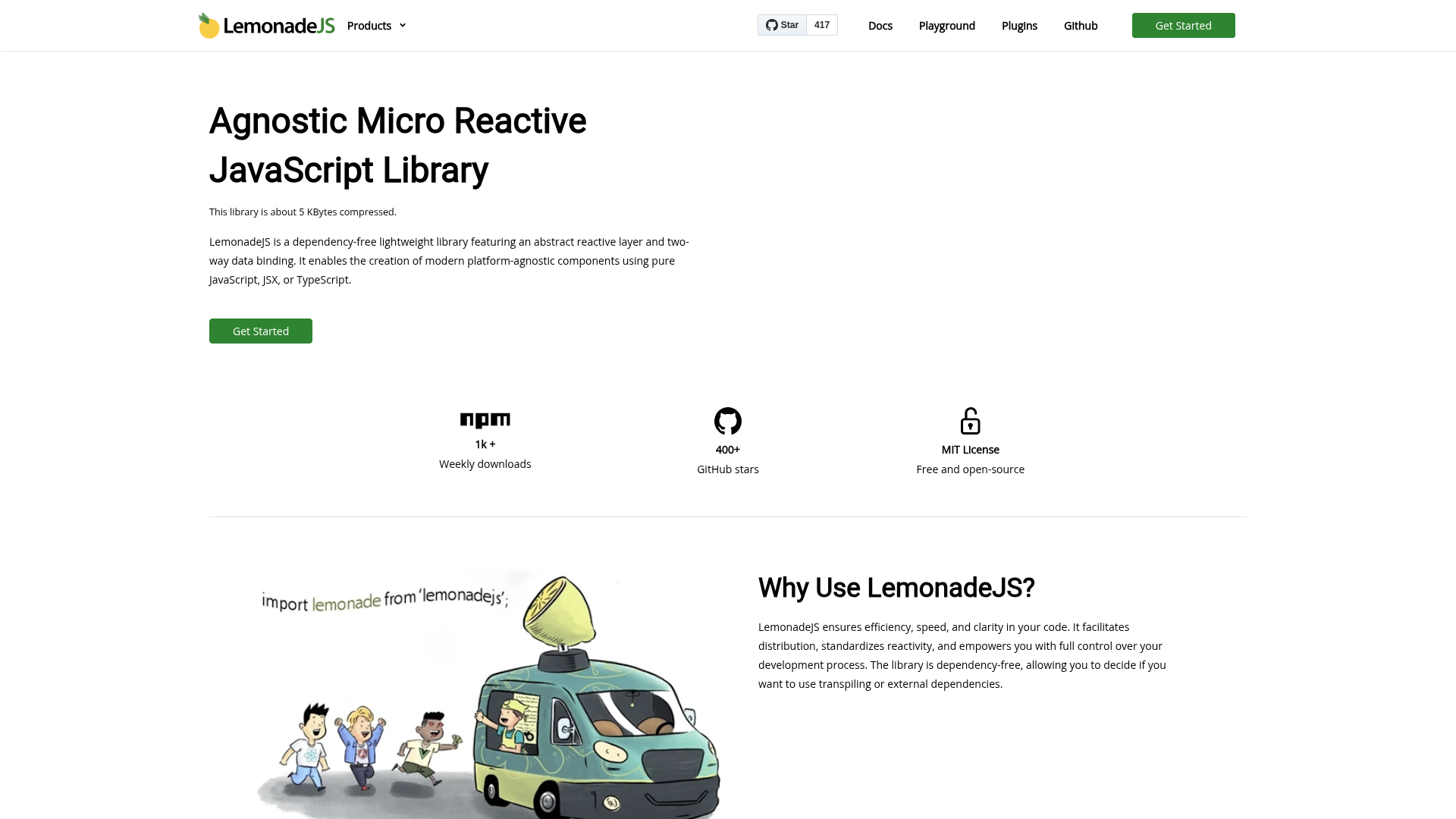
LemonadeJS - Lightweight reactive JavaScript library
UpdatedAt 2025-05-15
LemonadeJS is a dependency-free lightweight library featuring an abstract reactive layer and two-way data binding. It enables the creation of modern platform-agnostic components using pure JavaScript, JSX, or TypeScript. The library is just 5 KBytes compressed and integrates with popular front-end frameworks like VUE, React, and Angular. LemonadeJS ensures efficiency, speed, and clarity in your code while providing flexibility without sacrificing performance. It supports a pub/sub pattern for seamless synchronization and reactivity across applications. The library is free and open-source under the MIT License.
Product Introduction
LemonadeJS is a lightweight (5 KB compressed) JavaScript library designed for modern web development. It offers an abstract reactive layer and two-way data binding, enabling developers to create platform-agnostic components using JavaScript, JSX, or TypeScript. The library is dependency-free, ensuring flexibility and control over the development process.

Functional Principle
LemonadeJS uses a reactive layer to synchronize changes between component properties and HTML elements. Key features include:
- Two-way Data Binding: Synchronizes component properties with HTML element values.
- Sugar: A pub/sub system for global state management and action dispatching.
- Components: Reusable functionalities like data grids, modals, and calendars.
Usage
Basic Example
import { set, dispatch } from 'lemonadejs';
export default function Profile() {
set('updateName', (s) => {
this.name = s.name;
});
return render => render`<form>
<label>Name:</label><br/>
<input type="text" :bind="${this.name}" /><br/>
</form>`;
}
Key Features
- Lightweight: 5 KB compressed.
- Agnostic: Works with VUE, React, and Angular.
- Flexible: No dependencies or transpiling required.

Advantages and Disadvantages
Advantages
- Lightweight: Minimal footprint.
- Flexible: Supports multiple coding styles (JavaScript, JSX, TypeScript).
- Reactive: Efficient two-way data binding.
Disadvantages
- Limited Ecosystem: Fewer plugins compared to larger frameworks.
- Learning Curve: Requires understanding of reactive patterns.
Support and Service
LemonadeJS is open-source with community support. Documentation and examples are available on the official website.
FAQs
Traffic(2025-04)
Total Visit
6242
-7.70% from last month
Page Per Visit
1.66
-27.00% from last month
Time On Site
8.45
-69.42% from last month
Bounce Rate
0.45
-0.68% from last month
Global Rank
2853957
+21601 from last month
Country Rank(US)
2649826
+674151 from last month
Monthly Traffic
Traffic Source
Top Keywords
| Keyword | Traffic | Volume | CPC |
|---|---|---|---|
| js framework agnostic http library | 138 | 20 | - |
| js modal library | 132 | 160 | - |
| javascript date calendar design | 116 | 60 | - |
| how to create dynamic html table using javascript | 78 | 60 | - |
| javascript lightweight reactive library | 29 | 20 | - |
Source Region
Whois
| Domain | lemonadejs.com |
| Creation Date | 2028-04-15 10:55:35 |
| Last Updated | 2025-03-17 19:36:17 |
| Domain Status | clienttransferprohibited, //icann.org/epp |
| Registrar | Register.com, Inc. |
| Registrar IANA ID | 9 |
| Registrar URL | http://www.register.com |
Featured Products
TempMail
Instant disposable secure email
ATemplate
Free web templates for everyone
BacklinkX
Curated high authority backlink list
TempMailSafe
Create temporary email for safe browsing
ExplodingTopics
Track emerging trends early
ImageTranslateAI
translate image text instantly
PageFlows
Explore real-world UI/UX design flows
Atlas
Build interactive web maps effortlessly
Copy embed code
How to use


Discover and compare your next favorite tools in our thoughtfully curated collection.
2024 Similarlabs. All rights reserved.
Collections
Designer Tools CollectionCategories
AI Data Analysis ToolAI Content GeneratorAI AssistantAI Social Media AssistantAI Marketing Plan GeneratorAI Image EditorAI Video GeneratorAI Education AssistantAI Writing AssistantExplore
Featured ProductsFree ProductsLatest ProductsDomain Update in 6 MonthsDomain Update in 1 YearTop Traffic ProductsTop Traffic Growth Products2024 Similarlabs. All rights reserved.

